Yellowstone Supervolcano May Erupt Quicker Than Scientists Thought, Study Revealed

KEY POINTS
- The Yellowstone supervolcano had three major eruptions
- Researchers believe Yellowstone can quickly cause an eruption
- A scientist believes Yellowstone is not in danger of erupting anytime soon
A previous study revealed how quickly the Yellowstone supervolcano could produce a powerful eruption. Despite its dormant status, the researchers of the study noted that the massive volcano beneath Yellowstone National Park is capable of quickly entering an active state.
The Yellowstone volcano has produced three eruptions in the course of history. These occurred 2.1 million years ago, 1.3 million years ago and 640,000 years ago. The magnitude of these eruptions was credited for the formation of the region surrounding the Yellowstone caldera.
Due to the period between the previous eruptions, a lot of people believe that Yellowstone is already due for another major eruption. Back in 2017, a group of researchers from the Arizona State University visited Yellowstone and studied the minerals in fossilized ash produced during the last major eruption.
According to their findings, the eruption occurred after an influx of magma went into a reservoir below the caldera. Traces within the minerals indicated that the volcanic process that led to the eruption took place in a matter of decades and not centuries as previously believed by scientists.
“We expected that there might be processes happening over thousands of years preceding the eruption,” researcher Christy Till told The New York Times.
“It’s shocking how little time is required to take a volcanic system from being quiet and sitting there to the edge of an eruption,” researcher Hannah Shamloo added.
The findings of the researchers indicate that it doesn’t take much time for the Yellowstone supervolcano to erupt. Once the various volcanic processes begin to take place, it could take just a couple of decades before the volcano erupts.
Despite these details about the Yellowstone supervolcano, Michael Poland, the head scientist for the Yellowstone Volcano Observatory for the U.S. Geological Survey, noted that the massive volcano is not in danger of erupting anytime soon.
Through data constantly collected by sensors and satellites, Poland said that the agency has not yet detected factors that could lead to an immediate eruption.
“We see interesting things all the time,” he told National Geographic. “But we haven't seen anything that would lead us to believe that the sort of magmatic event described by the researchers is happening.”
© Copyright IBTimes 2025. All rights reserved.





















